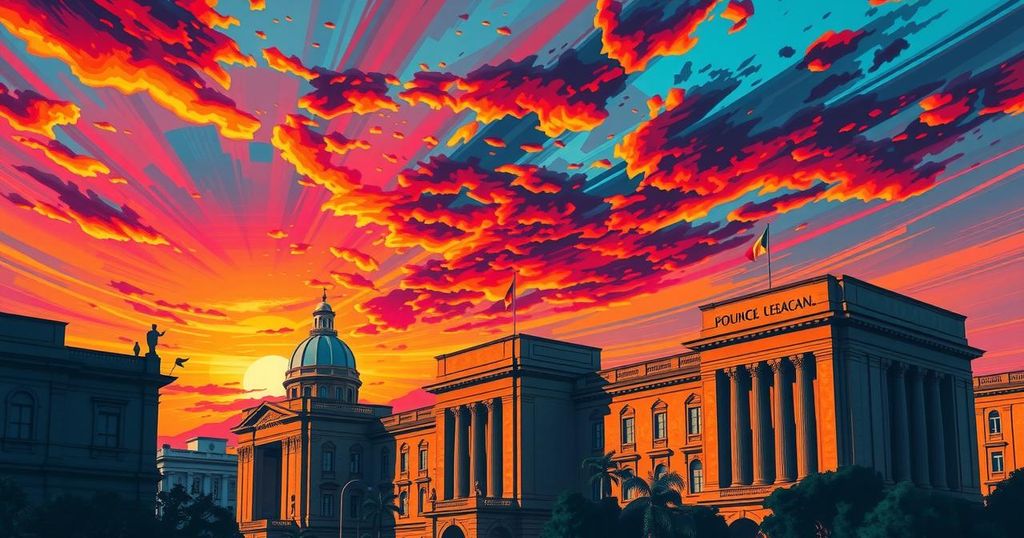Bolivia’s Electoral Court Disqualifies Morales and Suspends Key Candidate, Spark Backlash
Bolivia’s electoral court has barred former President Evo Morales from running in upcoming elections and suspended key candidate Andrónico Rodríguez. Criticism arose from both former leaders regarding the implications on democracy, as the ruling party’s popularity wanes amid economic crisis. Internal struggles within the MAS party highlight a deepening political rift as elections approach, leading to calls for protests against perceived injustices.
On Tuesday, Bolivia’s top electoral court ruled against former President Evo Morales, barring him from running for office while also suspending Andrónico Rodríguez, the other leading leftist candidate in the upcoming August elections. This decision strikes at the heart of the country’s left-wing opposition, significantly impacting President Luis Arce’s socialist party.
Evo Morales, recognized as Bolivia’s first Indigenous president, held power from 2006 until his forced resignation in 2019. He strongly condemned the court’s decision, denouncing it as an assault on the nation’s democracy. In a recent radio interview, Morales stated, “We have been persecuted” and raised concerns over what he views as a “grave threat facing democracy today.” Previously, he warned that barring him from the race would lead to civil unrest and protests.
Young Senate president Andrónico Rodríguez, a 36-year-old rising star among leftist voters disillusioned by Morales’ extended political ambitions and frustrated with Arce’s handling of Bolivia’s economy, expressed similar sentiments. Rodriguez criticized the ruling as a “political decision” and insisted that “no ruling or judicial decision driven by political interests can overrule the sovereign will of the people.”
The Supreme Electoral Court, in its justification for these disqualifications, provided technical reasoning as the candidate registration period was closing. This internal rift within the Movement Toward Socialism (MAS) party, instrumental in Morales’ political legacy, underscores a deeper power struggle between him and President Arce, his former ally.
Arce’s approval ratings have taken a hit with inflation soaring and fuel shortages becoming a daily challenge for citizens. Last week, he withdrew from the presidential race, opting instead to endorse his senior attorney, Eduardo del Castillo, as the new MAS candidate. Del Castillo, however, does not hold the same level of popularity as Morales or Rodríguez, leaving him at a disadvantage.
Interestingly, infighting among opposition factions—comprised of centrist and right-wing parties—leaves the anti-MAS movement without an obvious leader to capitalize on the growing discontent within the electorate. The Supreme Electoral Court’s list of registered opposition candidates features familiar names like Samuel Doria Medina, a businessman with a history of losing presidential bids, and former President Jorge “Tuto” Quiroga, who previously allied with past military regimes.
Morales’ disqualification had been on the horizon, as the electoral court noted that his nascent political faction, “Evo Pueblo,” failed to achieve official party recognition, alongside issues faced by an allied party hoping to support his candidacy. Moreover, a decision by Bolivia’s Constitutional Court that prohibits individuals from running for more than two presidential terms complicates Morales’ attempts to regain the presidency. Some analysts criticize this ruling as a signal of how political influences have manipulated the judicial system in the country.
Kathryn Ledebur from the Andean Information Network stated, “Arce benefitted from the rapid deterioration of the already weak justice system, failed to enact desperately needed reforms and manipulated the courts to his advantage.” These governmental and judicial discrepancies may turn the upcoming elections into a chaotic spectacle.
In what many found surprising, the court also put Rodríguez’s candidacy on hold pending further scrutiny of his political alliance. A preliminary hearing is now scheduled for Wednesday, as the leftist candidates continue to face mounting legal barriers. Interestingly, even members of the Supreme Electoral Court like Francisco Vargas have voiced concerns regarding the implications of these rulings for Bolivia’s democratic framework. He noted, “I alert the country and the international community that the democratic system is being put at risk by legal actions that seek to affect the normal development of the elections.”
In summary, the electoral court’s decision to disqualify Evo Morales and suspend Andrónico Rodríguez has ignited significant backlash, exposing the political fractures within Bolivia. As the presidential elections approach, many observers are concerned about the implications for democracy and the integrity of the electoral process following these controversial rulings. With ongoing economic struggles and a muddled opposition, the pathway forward for Bolivia remains uncertain, raising questions about the health of its democratic institutions.
Original Source: ca.news.yahoo.com




Post Comment